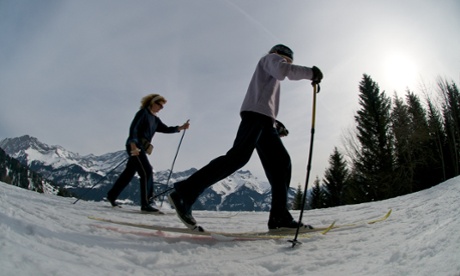
Tourism manager Dominique Geissberger is looking out from her office in the small Swiss alpine ski resort of Villars at forests dusted with fresh snow and spectacular mountains dazzling in the winter sunshine. “This pristine landscape is what we all depend on,” says Geissberger. “It’s what tourists expect to find when they come here.”
In an effort to protect the environment upon which the village’s tourist trade relies, Villars has embarked on a comprehensive programme of sustainability initiatives ranging from introducing a fleet of hybrid buses that ferry skiers about, to low-energy snow-making systems.
In recognition of its pioneering environmental work, Villars has become the first ski resort in Switzerland and one of three resorts in the Alps to be awarded the Flocon Vert – the green snowflake – a sustainable certifying label run by Mountain Riders, a French group that campaigns for a more sustainable winter sports industry.
Exploring the use of labels as a way of encouraging and implementing sustainable development in mountain regions is a key goal for the Sustainable Mountain Tourism Alliance (SMTA), a global network of groups and organisations working for sustainability in alpine tourism that has recently been launched in Switzerland.
“Climate change is the number one environmental concern now facing mountain communities,” says Dr Tobias Luthe, professor of sustainability science from the SMTA, speaking at its launch conference which was attended by representatives from the mountain-based tourism industry.
“Last year was the warmest on record and already this winter many alpine ski resorts have had an unusual lack of snow, leading to major economic losses. We urgently need new sustainable business models and labelling systems have an important role to play in promoting sustainable development in these mountain communities,” says Luthe. “By quantifying different criteria such as energy use, transport and waste, labels can be used to communicate sustainability to a range of different markets and, crucially, encourage best practice in the sector.”
The economic case for ensuring sustainable development in the Alps is compelling: about 80 million tourists visit the Alps every year, generating close to €50bn Euros, providing an estimated 10% of all jobs in the region.
There are more than 50 different labels available for mountain-based resorts and hotels across Europe and they vary enormously in what they measure and the scale and scope of qualifying businesses. For example, with 42 different environmental and social criteria, the Flocon Vert is one of the most rigorous labelling schemes and applies to the whole operation of a ski resort, from its transport infrastructure to its use of renewable energy.
The Swiss-based Ibex Fairstay scheme meanwhile only certifies individual hotels and is a more entry-level scheme requiring relatively few environmental initiatives for businesses to qualify.
So what are the benefits of these labels? “The key benefit is that many labels require businesses to reduce their energy and water use which in turn can save them money,” says Herbert Hamele, who chairs Ecotrans, the European network for sustainable tourism development. “The other key benefit is that businesses which have been awarded a label also have a marketing edge over their competition.”
Anne Dorte Carlson, who manages the Sustainable Destination Norway label, agrees with Hamele: “We’ve surveyed tour operators and 62% say that they would more likely be interested in a destination if it carries a sustainable or environmental label,” says Carlson. “We believe that in the future this will give us a competitive advantage.”
The commercial benefits of an environmental label have been confirmed by Trip Advisor, a colossus in the global tourist industry which is now rolling out its Green Leaders programme in Europe, having launched the scheme in North America in 2013.
“The Green Leaders programme is designed to help travellers book a greener trip by recognising hotels and B&Bs that engage in environmentally friendly practices ranging from recycling to energy use,” says Trip Advisor’s Tom Breckwoldt, speaking at the SMTA’s launch conference. “Qualifying properties are then marked with a badge on their Trip Advisor home page.”
Significantly, Breckwoldt revealed that Trip Advisor’s own research has found that Green Leader businesses are 20% more likely to be booked compared with those that haven’t signed up to the free scheme.
With more than 300 million people using Trip Advisor every month, many believe that this new initiative has the potential to be a game-changer in the push for more sustainable development in mountain regions. “Small groups such as Mountain Riders are doing great work but they don’t reach the majority of people,” says Luthe.
“Trip Advisor is a very powerful way of reaching a massive audience and if they implemented a combination of tools recommended by the SMTA then this could be really exciting.”
Back in Villars, Geissberger is in no doubt about the importance of ensuring that the village heads in a more sustainable direction. “The environment is our future, it’s how we earn our living,” says Geissberger. “If we lose it, we’ll lose our tourism and then we’ll lose everything.”
The sustainable living hub is funded by Unilever. All content is editorially independent except for pieces labelled brought to you by. Find out more here.
Join the community of sustainability professionals and experts. Become a GSB member to get more stories like this direct to your inbox.

